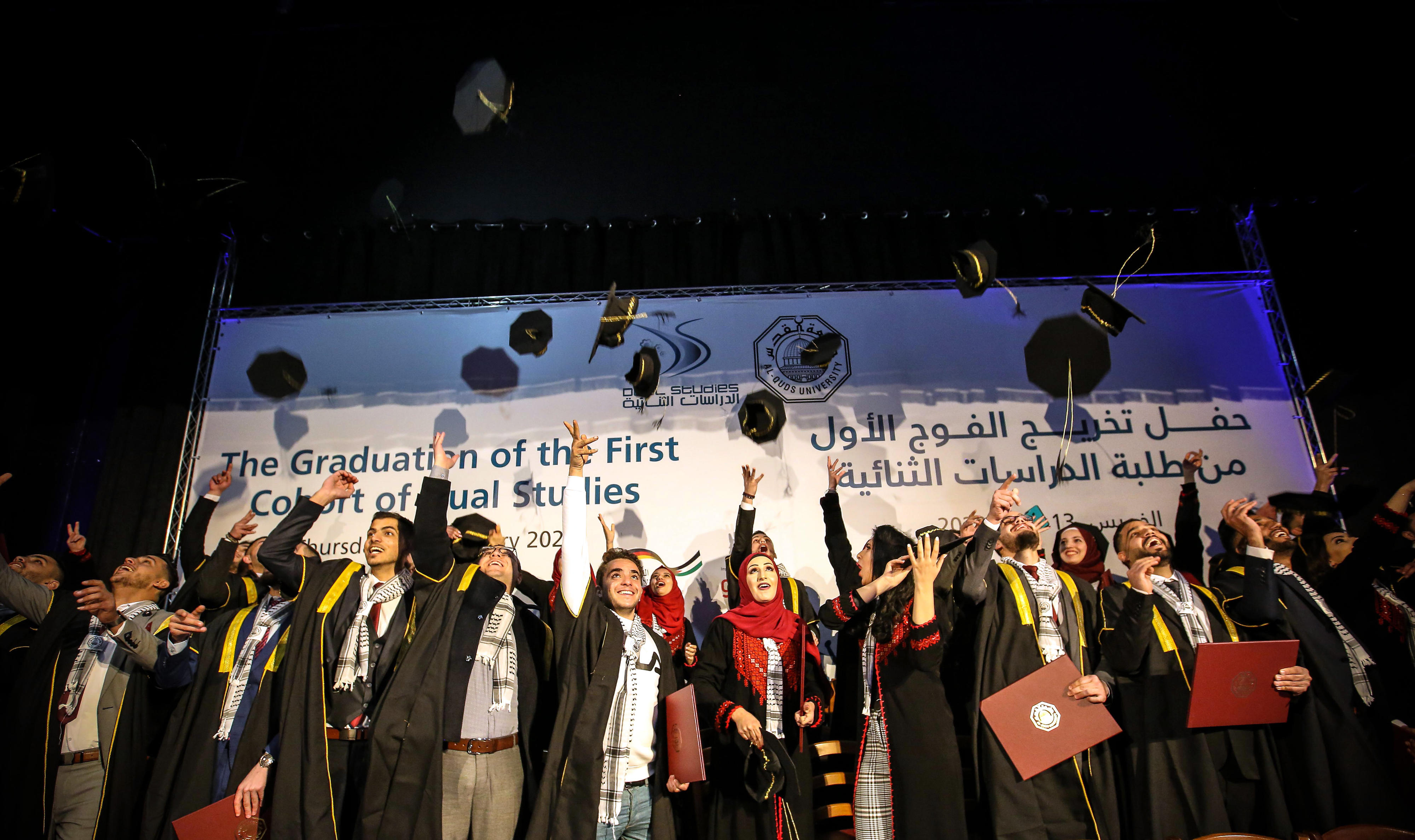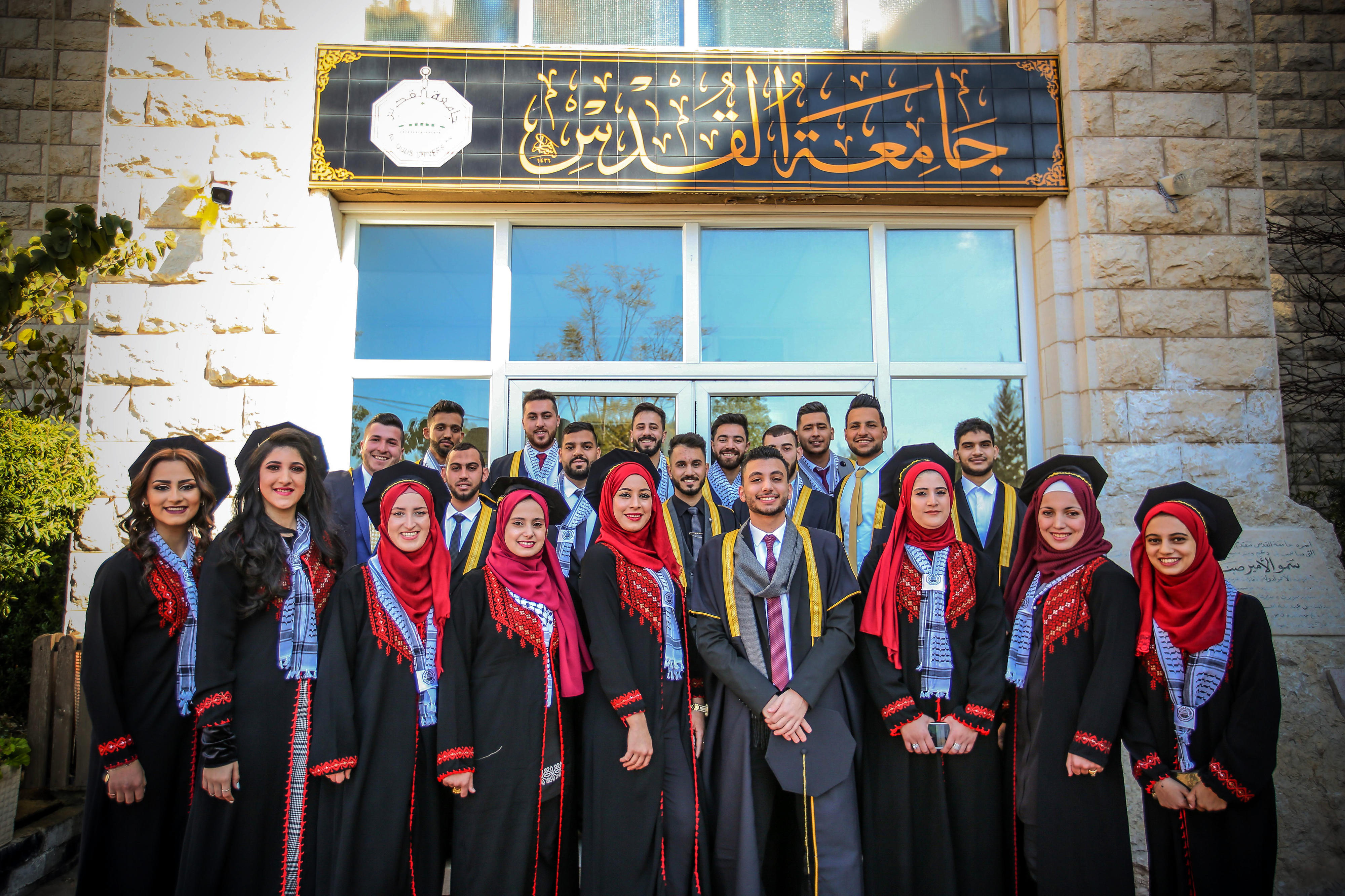Dual study programmes at Al-Quds University in East Jerusalem: Diploma award ceremony and celebration for the first graduates who completed their studies in electrical engineering and information technology in February 2020
Copyright© GIZ PS/MJO Project
Core area “Sustainable economic development, training and employment” Creating opportunities
Some 65 per cent of the people in the Palestinian territories are under 30 years of age. Every year, more than 50,000 school leavers are added to the labour market, where unemployment rates are high, especially for young people, women, higher education graduates, persons with disabilities, and people living in certain regions of the Palestinian territories (Area C, Gaza Strip).
The escalation of the Middle East conflict in the wake of 7 October 2023 has hit the Palestinian economy hard. It shrank by 27 per cent in 2024. That same year, the unemployment rate in Gaza and in the West Bank rose to 80 and 29 per cent, respectively. Many of the Palestinians who were making a living by working in Israel lost their work permits after 7 October. Due to the difficult employment situation, the Palestinians in diaspora who regularly send remittances play a significant economic and social role for the Palestinian territories.
Efforts to develop the vocational training sector
Among the Palestinian public, great importance is attached to education and training and to equal access to education for boys and girls. By regional comparison, the level of education is high. The Palestinian Authority wants to work towards better acceptance of vocational training among the people and more demand for such training, alongside higher education, which is in high demand. The Palestinian private sector is primarily characterised by family-owned businesses and small companies with just a few employees. These businesses need skilled workers.
Aspects that need to be addressed, in addition to training, include financing, competitiveness and value chain development. Policymakers need to work on these matters in a targeted manner so that small enterprises become able to help create more jobs.
There is also a lack of Palestinian products that could meet domestic market demand. The West Bank market is dominated by goods from Israel, whereas the Gaza Strip market is dominated by products from Egypt and Turkey.
German activities
The German Development Ministry (BMZ) is engaged in a broad range of activities in the Palestinian territories:
- Support for a social-ecological transformation of the Palestinian economic system into a green, climate-smart economy
- Support for training – especially for young people and women – to give people a basis for future employment and economically successful adult life
- Support for temporary employment through labour-intensive infrastructure development
- Development of a vocational education system that takes account of private companies' needs as future workers are trained
- Introduction of vocational education elements in higher education
- Job placement services and wage subsidies
- Building people's capacity to start their own business
- Efforts to strengthen promising niches in the private sector, such as IT services and food processing
- Improvement of the business environment through the development of deposit insurance and a credit guarantee fund in order to protect bank loans for business start-ups, for example
- Improvement of financial literacy among the people and assistance for the authorities in lending transactions
Project example: Tenth anniversary of the dual study programme in the Palestinian territories
Dual study programmes at Al-Quds University in East Jerusalem: Group photo of the first graduates in February 2020
Dual study programmes, that is programmes which involve higher education institutions as well as companies, combine academic education with practical experience. They are considered a successful model for ensuring the supply of skilled labour. Germany has been supporting the introduction of this model in the Palestinian territories since 2015. As many as ten accredited bachelor programmes in the fields of business, IT and engineering are now being offered by Al-Quds University in East Jerusalem (since 2015) and Palestine Polytechnic University in Hebron (since 2022) in cooperation with about 380 enterprises.
A total of 700 students are currently enrolled in the programmes, of whom some 55 per cent are women. The practice-oriented programmes enable 70 per cent of the graduates to make a smooth transition into the labour market. The programmes also encourage innovation at private companies.
Al-Quds University is now operating the programme independently. This signature project under Palestinian-German cooperation serves as a model for other higher education institutions in the region that are seeking to establish employment-oriented programmes.

